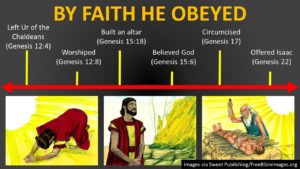EXPOSITORY ARTICLE – Romans 4
Sean Cavender | Bald Knob, Arkansas

Paul’s epistle to the church at Rome declares God’s salvation and the extent of His grace. Justification is by grace through faith for all men. Paul’s primary example for how God justifies men by grace through faith is Abraham.
To understand Romans 4, it is best to see how it relates to the opening chapters of the epistle. The first three chapters of Romans prove all men have sinned (Romans 3:9, 23), all are worthy of death (Romans 1:32), and there is no defense or appeal that might rationalize our sin (Romans 3:19). All are guilty of sin and all need God’s amazing grace.
God is just and the justifier (Romans 3:26) – He is just in condemning sin, but He is also the source of salvation and liberty. God provides the way for sinners to be justified from guilt, saved from wrath, and forgiven of sins. The blood of Jesus Christ is the means whereby God saves sinners (Romans 3:22, 24-25). The death of Christ, where His blood was shed, is a demonstration of God’s righteousness (Romans 3:22; 1:18). God in His sovereign authority has declared how sinners can be saved: by faith in His Son. Therefore, those who believe in Christ and His atoning blood may have their sins forgiven.
One major objection Paul anticipated from his readers was the Jews’ confidence in the Law (Romans 3:19-21). However, the law of Moses could not save and gave no reason to boast (Romans 3:27-28). As a writer, Paul moves his audience from perceiving God’s work as a system of works to a law of faith. The law and system of faith which Paul defends is actually a fulfillment of the Law (Romans 3:31). The Law was a witness and testified to salvation by grace through faith (Romans 1:17; Habakkuk 2:4).
Paul turns to the example of Abraham (Romans 4:1-4). By going to the Old Testament, and particularly the book of Genesis (authored by Moses), Paul is demonstrating the purpose, usefulness, and weakness of the Law while establishing the law of faith. By examining the life of Abraham, Paul strips his opponents, the Judaizing teachers, of their arguments. Paul appealed to the father of the Jews (Romans 4:1) to demonstrate how he was justified by faith, not by works (Romans 4:2-3).
However, the usefulness of Abraham’s example cannot be overlooked. Not only was Abraham the ideal example to the Jews, but also to the Gentiles. Abraham was justified while uncircumcised (Romans 4:10), qualifying him as an example for Gentiles. God justifies all, Jew or Gentile, whoever believes in Jesus Christ.
Righteousness Was Credited To Abraham
“For what does the Scripture say? ‘Abraham believed God, and it was credited to him as righteousness.’ Now to the one who works, his wage is not credited as a favor, but as what is due. But to the one who does not work, but believes in Him who justifies the ungodly, his faith is credited as righteousness,” (Romans 4:3-5, NASB).
Paul began his defense of justification by faith with Genesis 15:6, which declares Abraham a righteous man because of his belief in God. His faith was counted to him as righteousness. The word imputed, or counted, means to be accredited; it is a banking term. Since Abraham believed, God accounted Abraham as righteous.
This credit placed on Abraham’s account was not due to anything Abraham had worked for himself or earned. He did not work as one who was due his wages. He believed God, so faith was accounted to Abraham apart from works (Romans 4:4-5).
Many people struggle with Paul’s argument in Romans 4. Adherents to the doctrine of salvation by faith alone have mishandled this text, and many Christians struggle with the text as a result. The concept of works has troubled and shaken some people’s faith. Many try to define the word “works” in this passage to mean “something you do,” or some kind of spiritual activity. As genuine believers, we ought to understand our salvation was not earned; we did not work to achieve our salvation. Salvation is by God’s grace – we must not be shy from understanding grace, nor from declaring it openly. However, it is essential we examine the context of Romans 4 to understand How Paul is using the word “works.”
Paul is defending justification by grace, proving salvation is by faith without respect to the deeds of the law of Moses. The apostle went on to contend that boasting was excluded because a person is saved by faith, apart from the works of the law (Romans 3:27-28), “because by the works of the Law no flesh will be justified in His sight; for through the Law comes the knowledge of sin” (Romans 3:20).
Abraham was not justified by his flesh, since he was uncircumcised when he was declared righteous (Genesis 15; Romans 4:1-2, 10). It was not by works of the law since the law of Moses came 400+ years later. For the Judaizing teachers who demanded Gentiles observe circumcision and the law of Moses, Paul’s argument is deafening – Abraham was not saved by the flesh; he was not justified by keeping the law. He was justified by faith!
Seeing Abraham’s faith demonstrated, God blessed Abraham and declared him righteous (Romans 4:3). The Lord no longer held sin against Abraham’s account, but made him righteous (Romans 4:7-8). Righteousness was imputed to Abraham through God’s forgiveness. The forgiveness of sins is an act of God; it is a demonstration of His mercy and grace.
Salvation and forgiveness of sins are the result of God’s grace and man’s faith.
Walk in the Steps of Abraham
The blessing of forgiveness, justification, and salvation are not only for those who are circumcised, but for all men (Romans 4:9-11). Abraham became the father, not of the Jews only, but also of the uncircumcised Gentiles. For those who follow in the steps of father Abraham, justification by faith may be applied.
Bear in mind, Paul is writing to saints in Rome. They were saved, believing in Christ as the Son of God. The Roman epistle exhorted these believers to a more perfect understanding of the gospel, and encouraged them in the obedience of faith (Romans 1:5; 16:26). Paul exhorts the believer to “follow in the steps of the faith of our father Abraham” (Romans 4:12) He wants us to follow the example of Abraham’s life!
Abraham lived a life of obedience – “By faith Abraham obeyed when he was called to go out to a place that he was to receive as an inheritance. And he went out, not knowing where he was going” (Hebrews 11:8, ESV). Abraham was not a first-time believer in Genesis 15; it represents a step in the growth of his faith, but he had demonstrated faith prior to this.

The Hebrew writer refers to Abraham leaving his home by faith (Genesis 11:27-32; 12:1-6). He built an altar and worshiped God (Genesis 12:8; 13:18). He believed God’s word and the promise of an heir (Genesis 15:6). He was circumcised when God commanded it (Genesis 17). Abraham’s faith became so great, he eventually offered the son of promise on the altar in Genesis 22. Abraham grew in his faith and trust in God’s grace. He walked in obedience, humbly submitting to God.
Romans 4 is a passage which affirms salvation by God’s grace. It also defends justification by faith. The quality of Abraham’s faith (and by extension, what our faith should be) was not an inactive, trust-only, mental acknowledgment. Justifying faith is an obedient faith. Belief trusts in God’s promises and acts in harmony with God’s will. This is evident from Abraham’s life – he trusted in God and acted accordingly.
Consider the nature of Abraham’s obedience. It was genuine, not ritualistic; it was devoted, not half-hearted; it was a decision, not merely a habit. Gospel preachers have long and rightly affirmed what Jesus said, “If you love Me, keep My commandments” (John 14:15). True love for God is evidenced by our compliance with God’s word. Some hearers may have wrongly assumed obedience by rote and ritual would be satisfactory to God, or God must accept it. Others may have wrongly judged we need less preaching on obedience and more preaching on grace, or trusting God. Both extremes have missed the point! We must have a faith that obeys. Biblical obedience must be genuine, devoted, godly, and make a conscientious decision. Abraham believed God, obeyed God (even in the difficult times), and was justified by his faith.
Believers Walk Like Abraham
Justification begins with faith in God, but it embodies so much more. It calls for true faithfulness, a concerted effort to live in the service of God and His Son. Having faith in God is not about a single moment in time, but is a comprehensive way of life; involving faithful duty and service to God throughout our lifetime.
After we are baptized into Christ (Romans 6:3-4), we are raised to walk in newness of life. It is a genuine believe in Christ which results in the penitent sinner submitting to baptism in water for the forgiveness of sins (Acts 2:38). Only then may we enjoy the blessings of justification, salvation, and righteousness. Those who have not been buried in the waters of baptism remain unjustified and dead in sins.
“For all who are being led by the Spirit of God, these are the sons of God” (Romans 8:14, NASB)
The children of God are to be led by the Spirit and continually walk by the Spirit of God. We are led by the Spirit when we actively walk by the law of the Spirit (Romans 8:2) and determine not to fulfill the desires of the flesh (Romans 8:12-13). Having the mind of the Spirit will cause us to submit to the law of God (Romans 8:6-8).
The Legacy of Abraham
Abraham left an amazing legacy of trusting in God and believing in the power of His grace. Emulating Abraham’s life must be one of the ways the Scriptures give us hope and exhortation (Romans 15:4). However, the promise of God through Abraham’s Seed that all nations might be blessed – that Seed, was and is Jesus Christ. Just as Abraham believed in God’s promise of sending a Savior, we must believe in Jesus Christ. He died and was raised from the dead for our justification. We must have the faith of Abraham – and when we do, we can have the assurance of salvation, just as it was “credited to him [Abraham] as righteousness.”
“Now not for his sake only was it written that it was credited to him, but for our sake also, to whom it will be credited, as those who believe in Him who raised Jesus our Lord from the dead, He who was delivered over because of our transgressions, and was raised because of our justification” (Romans 4:23-25).
* All passages quoted from the New American Standard Bible unless otherwise noted.
17.10.03 | GROW magazine
